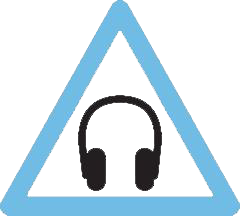ARG - Walnut Ridge, US - Walnut Ridge Regional Airport
proudly presents
For guests with AUTISM SPECTRUM DISORDER and other neurodiverse conditions.
About this Guide
The information in this guide has been prepared by Autism Double-Checked to assist visitors with ASD when visiting ARG - Walnut Ridge, US - Walnut Ridge Regional Airport. For neurodiverse visitors, please make use of the information that may relate to your visit. For neurotypical parents, caregivers or traveling companions, please make use of this to assist the special guest that you are accompanying.
The objective, throughout, is to give advance information about sensory, and other, issues that may need extra consideration for visitors with ASD. The Guide gives information about the nature of these issues. Guests should view this information in the context of their own, unique, challenges.
Due to the wide variety of issues that may arise for individuals with ASD, such guidance is general in nature. If you encounter something that is not covered in this guide, please contact the Autism Concierge by clicking the link in the Autism Concierge section below prior to your visit or seek the help of a member of airport staff once you are there.
Throughout this Guide, we make use of the following Sensory Issue Advisory Triangles.
-
 Safety
Safety -
 Crowds
Crowds -
 Body
Body
Awareness -
 Time or
Time or
Duration -
 Noise
Noise -
 Lighting
Lighting -
 Taste or
Taste or
Smell -
 Heat or Cold
Heat or Cold
Autism Concierge
Autism Passport
Airline App
- IOS App Link:
- https://www.micokotofy.us
- Android App Link:
- https://www.xylixehahy.me
Important General Information
- Address:
- 995 Rua Quinze de Novembro, Irure pariatur Opti, SP 18800-041, Brazil
- Phone Number:
- +1 (987) 253-9442
- Website:
- https://www.nasasuva.ca
Sensory and Inclusion Services
To enhance the comfort of all travelers, our airport follows a 'silent airport' policy. Public announcements are limited to essential information and emergency messages only. We encourage passengers to stay informed via flight information displays and mobile notifications
A quiet/sensory room is available and is located at Error excepteur esse
A play area suitable for general use is available and is located at Quos aliquam officia
The airport participates in the Hidden Disabilities Sunflower Program and lanyards may be obtained from Et labore asperiores
A therapy/comfort dog program operates for part of the time
| Airlines |
|---|
| WN - Southwest Airlines |
| DH - Norwegian Air Norway |
| Airport |
|---|
| BFG - Bullfrog, US - Bullfrog Basin Airport |
| CFG - Cienfuegos, CU - Jaime Gonzalez Airport |
| Name | Distance |
|---|---|
| Kennan Stone | Et culpa nisi harum |
Nearest Emergency Room(s)
| Name | Distance |
|---|---|
| Tate Leblanc | Corrupti est sunt a |
Nearest Pharmacy(ies)
| Name | Distance |
|---|---|
| Shelby Little | Illo nesciunt assum |
Preparing for Your Flight
Make use of the airport website at: https://www.nasasuva.ca
Review the information given in this guide.
If you need further specific information that is not covered by either of the above resources, you should contact the Autism Concierge by using the link in Autism Concierge in the introduction to this Guide.

Crowds
In general terms, February, March, April, June, August, and September are the quietest. Weekends, Fridays, Saturdays, and Sundays are generally the quietest times of the week.
Visitors who have problems with crowds may wish to take this information into account when planning a visit.
Online Check-in
Most airlines offer online check-in 24 hours prior to departure time. It is recommended that you do this. It will save you time and trouble at the airport.
Even with online check-in, arrive at least two hours early and allow plenty of time for the security process.
Security Screening (TSA)
Not all airport screening agents may have been trained to assist passengers with special needs.
You should call TSA Cares (1-855-787-2227 Option #2) at least 72 hours in advance of your flight, describe any potential issues and request a Passenger Support Specialist. If you do not do this, you should Identify yourself to the agent at the checkpoint and let them know that you are traveling with a special-needs passenger. Outline any sensory issues that you think might create difficulties for your loved one.

Waiting or Duration
The line may be long and slow-moving. Ask the security agent for priority in getting to the front of the line and minimizing accidental physical contact with strangers.

Body Awareness
Some screening checkpoints may utilize full-body scanners. These can only accommodate one person at a time which may be distressful for some people. Try practicing the feet apart, hands touching over the head position at home with your loved one to prepare them for screening.
If you feel that they may have difficulties in the scanner, discuss alternatives with the security officer. CAUTION. The standard alternative to the body scanner is a pat-down search. Since this may also be difficult, be sure to look at all possible alternatives with the officer.

Noise
Aside from background noise, there is a possibility of bells/alarms being sounded with no notice. Even those with moderate noise sensitivity may benefit from the use of noise cancelling headphones. If you are asked to remove them, explain this concern and to have the removal be as short of a time as possible. You must also explain to your child in advance that they will have to empty their pockets and temporarily hand over phones, iPads or favorite toys.
Lost Person Help and Other Safety Information

Safety
-
- Lost Person Protocol:
- If a family member gets lost, report to a member of the front desk staff and request an alert to all staff members who may be able to assist in searching.
- Give them as much information as possible including gender, age, race, clothing description, last known location, direction of travel, if known, and communication abilities (verbal/non-verbal/understands verbal communication).
- It is recommended that you have a recent photo available on your mobile device so that you can share it with the resort team.
- In normal circumstances GPS functions throughout the premises and there are no “blind spots.”
- Stay at the front desk. This will enable the resort team to locate you as soon as possible once your family member has been located.
Passenger Areas
-
- Type of Area:
- After security

Noise
-
- Sound Source:
- alarms
-
- Sound Type:
- Live Music, Recorded Music, Public Address Announcements, Outside/Street Sounds
-
- Sound Intensity:
- Loud - normal conversation may be difficult

Lighting
-
- Lighting Type:
- Fluorescent, Spotlight
-
- Lighting Intensity:
- Subdued

Heat or Cold

Body Awareness
Restaurants and Food Service
Restaurants
| Type of Area | After security |
|---|---|
| Cuisine Type | Qui excepturi ipsa |
| Service Times | Dinner |
| Location of Seating | Food court seating |
| Dietary selections on menu/as standard service | Dairy Free , Vegan |
| Additional Dietary selections offered on request | Soy Free , Nut Free , Vegetarian |
| How to request special dietary requirements | Ask when dining , Prior notice |
| Types of Sound | Public Address Announcements , Outside/Street Sounds |
| Sound Intensity? | Loud - normal conversation may be difficult |
| Type of Lighting | Spotlight |
| Lighting intensity | Subdued |
| Average wait time to be seated (In approximate minutes) | 18 |
| Average wait time for food to be served (in approximate minutes) | 45 |
Other Amenities and Services
-
- Type of Service:
- Quia aute commodi qu
-
- Type of area:
- before security
-
- Other recreational facilities
- Excepteur incididunt
